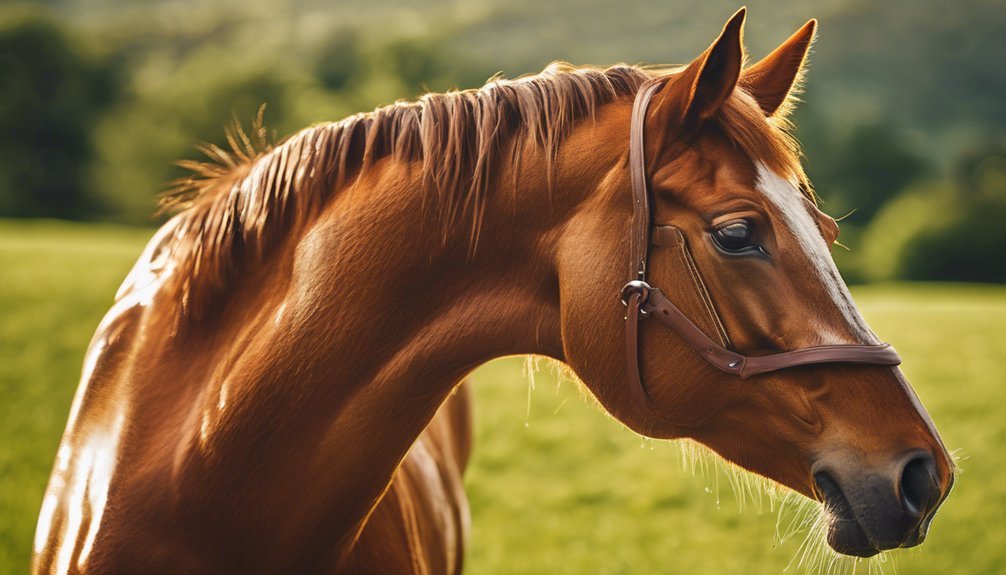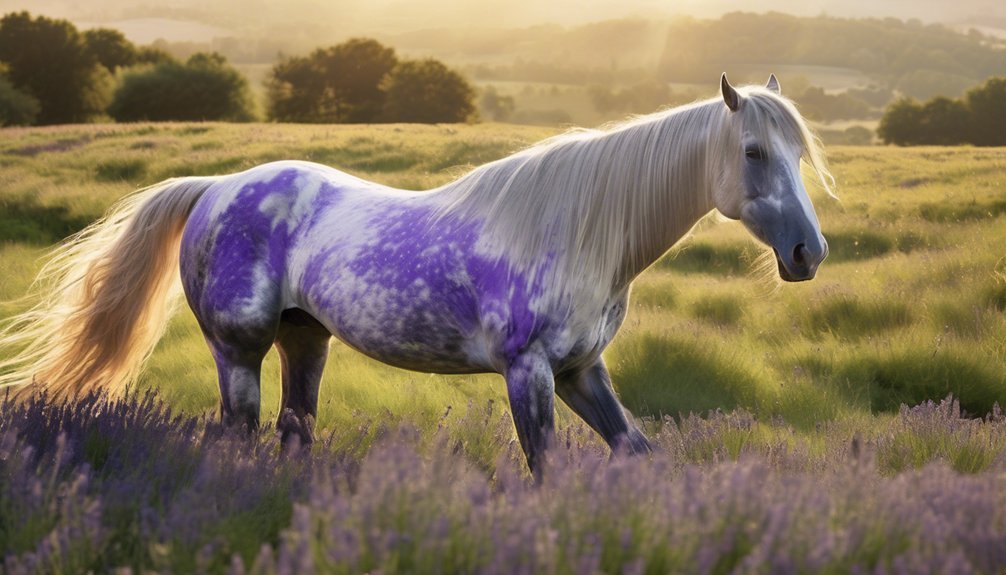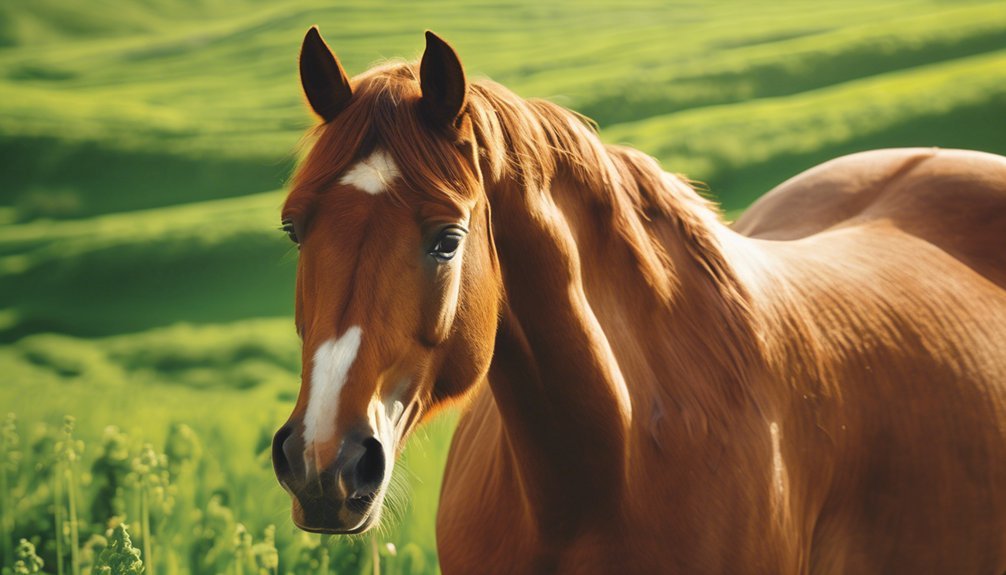
Did you know that a horse's coat can reflect their overall health and well-being, with protein intake playing a vital role in this? Protein is essential for the growth and repair of hair follicles, impacting not just appearance but also strength and resilience. Without adequate protein, you might notice signs of dullness or thinning in your horse's coat. Understanding the specific protein requirements and sources is crucial for maintaining that healthy shine.
Key Takeaways
- Protein is essential for hair follicle regeneration, promoting robust growth and overall coat health in horses.
- High-quality protein sources, like alfalfa and soybean meal, provide necessary amino acids for a shiny coat.
- Inadequate protein intake can lead to a dull coat, thinning hair, and excessive shedding.
- Digestibility of protein affects nutrient absorption, influencing the strength and vitality of the horse's coat.
- A balanced diet, complemented by protein, supports overall well-being and reduces skin irritations.
Understanding Protein and Its Functions in Horses

When you think about your horse's overall health, it's essential to understand the role of protein in their diet.
Protein types, such as structural and functional proteins, play vital roles in growth, repair, and maintenance of tissues. Your horse's body relies on protein digestion to break down these nutrients into amino acids, which are crucial for various physiological processes.
Adequate protein intake ensures that your horse can build muscle, maintain a strong immune system, and support overall well-being.
Remember, not all proteins are created equal; high-quality sources, like legumes and certain grains, provide the necessary amino acids your horse needs.
How Protein Affects Hair Follicle Growth
While you might not think about it often, protein plays a crucial role in hair follicle growth for your horse. It's essential for hair follicle regeneration, as it provides the necessary building blocks for protein synthesis. When your horse receives adequate protein, hair follicles can develop more robustly, leading to a healthier coat. A deficiency can stifle growth and even lead to hair loss.
| Factor | Impact on Hair Follicle Growth |
|---|---|
| Protein Intake | Supports hair growth |
| Amino Acids | Essential for regeneration |
| Quality of Protein | Affects hair strength |
| Digestibility | Influences nutrient absorption |
| Overall Diet | Complements protein effectiveness |
Ensuring your horse's diet is rich in quality protein fosters optimal hair follicle health.
The Role of Essential Oils in Coat Health

Essential oils can significantly enhance your horse's coat health by providing a range of beneficial properties that support skin and fur vitality.
When you incorporate essential oils into your grooming routine, you harness essential oil benefits such as improved moisture retention and enhanced shine. Oils like lavender and tea tree not only moisturize the coat but also possess antimicrobial properties that promote healthy skin.
This combination helps prevent dryness and irritation, ensuring a resilient and vibrant coat. Regular use of these oils can also reduce stress in your horse, contributing to overall well-being.
Signs of Protein Deficiency in Horses
Although protein is a crucial nutrient for maintaining your horse's overall health, signs of deficiency can often go unnoticed until they become more pronounced. You might observe changes in hair quality, such as dullness, thinning, or excessive shedding. Additionally, a lack of nutritional balance can lead to delayed coat growth and increased susceptibility to skin issues.
| Sign of Deficiency | Description |
|---|---|
| Dull Coat | Lack of shine and luster |
| Thinning Hair | Noticeable loss of hair volume |
| Excessive Shedding | Increased hair loss beyond normal |
| Skin Issues | Higher likelihood of skin irritations |
Best Protein Sources for Your Horse

Maintaining a healthy coat in horses hinges on providing adequate protein, which directly influences hair growth and quality. High-quality forage, such as alfalfa and clover hay, serves as an excellent primary protein source.
These forages are rich in essential amino acids, promoting not just coat health but overall well-being. If your horse's protein needs aren't met through forage alone, consider adding supplemental feed like soybean meal or commercial protein pellets.
These options deliver concentrated protein levels, ensuring your horse receives the necessary nutrients. Always choose supplements that complement your horse's diet and address its specific needs.
Recommended Daily Protein Intake for Horses
To support optimal coat health and overall well-being, it's crucial to understand the recommended daily protein intake for horses.
Generally, adult horses require about 10-14% of their diet to be protein, depending on their size, activity level, and whether they're pregnant or nursing.
For instance, a 1,000-pound horse may need around 800-1,200 grams of protein daily.
It's essential to consider different protein types, as not all proteins provide the same amino acids.
High-quality sources, such as alfalfa and soybean meal, can fulfill these daily requirements effectively.
Monitoring your horse's condition and adjusting their diet accordingly will ensure they receive the right balance of nutrients for a healthy, vibrant coat.
Frequently Asked Questions
Can Protein Supplements Improve My Horse's Coat Appearance?
Yes, protein supplements can enhance your horse's coat appearance. Incorporating quality protein sources and maintaining a consistent coat grooming routine will promote a healthy shine, ensuring your equine friend looks their best and feels great.
How Long Until I See Coat Improvements From Increased Protein?
Picture your horse's coat shimmering under the sun. You'll likely see noticeable improvements within six to eight weeks of increasing quality protein sources. Consistent protein intake supports coat maintenance and fosters that healthy, vibrant look you desire.
Are There Side Effects of Excessive Protein in Horse Diets?
Excessive protein can lead to protein toxicity in horses. You'll want to monitor for symptoms like weight loss, lethargy, or digestive issues. Identifying these early helps prevent serious health complications, ensuring your horse stays healthy and happy.
Do Different Horse Breeds Require Varying Protein Levels for Coat Health?
Yes, different horse breeds have breed specific needs for protein levels. Understanding these requirements helps you choose appropriate protein sources, ensuring your horse maintains a healthy coat while meeting its unique nutritional demands.
Can Environmental Factors Affect Protein Absorption in Horses?
Did you know that nearly 30% of horses face digestive issues due to environmental stressors? These factors can significantly impact protein absorption, affecting your horse's overall digestive health and nutrient utilization for optimal well-being.
Conclusion
In conclusion, ensuring your horse receives adequate protein is like nurturing a vibrant tapestry—the strands of hair thrive and shine when woven with care. A balanced diet rich in quality protein not only supports healthy hair growth but also strengthens the overall coat. By recognizing the signs of protein deficiency and providing optimal nutrition, you can help your horse flaunt a lustrous coat that reflects their vitality and well-being, making them stand out in any paddock.





